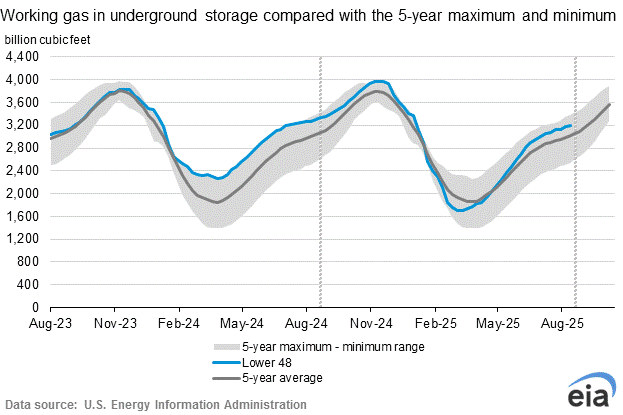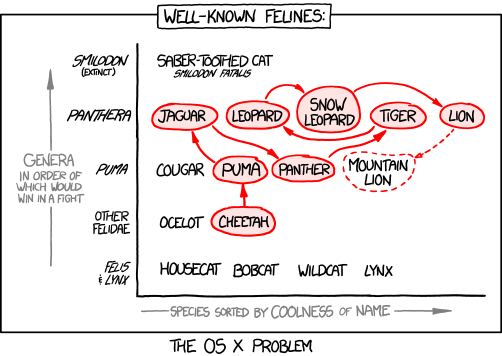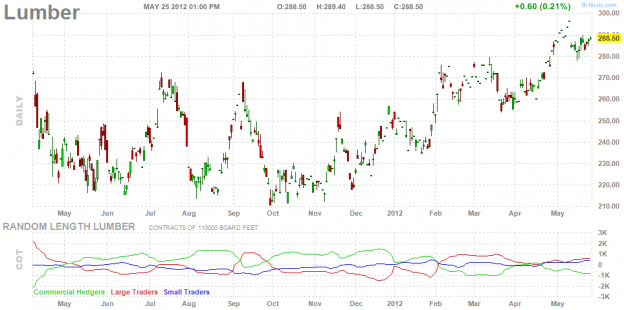The front futures are down 4.3 cents at $2.525.
Two caveats to our dour outlook for natty:
1) The weather. The 90-day forecasts are for slightly above average temperatures but lower than last year.
If we should catch a couple heat waves injections into storage will be lower. The location of the heat is also imortant. If it is in Phoenix, meh. If it is over the NYMEX and the gas traders break a sweat they'll bid the stuff up.
2) Depletion rates. We're hearing from lessors that their royalty payments from wells drilled two years ago are reflecting declining production on the order of 50-70%. this is partly due to the nature of shale and partly due to what happens to the fracking compounds over time.
Because this stuff is so new no one has exact numbers on what total production and production rates will end up at.
More on this in a couple weeks.
A third possible concern is that at $2.749 we saw electric utilities delaying conversion from or actually converting back to coal.
We'll post on this tomorrow.
From MarketWatch:
Prices have risen 35% from their year lows, but some see top
A double-digit pop for natural-gas futures puts
them among May’s best performing investments, but for the notoriously
volatile and weather-dependant commodity, timing is always the trickiest
part.
Natural gas slipped under $2 per million British thermal units in April,
to its lowest in a decade. It has gained 35% from those levels, to over
$2.50 per million BTUs.
It will likely be “very tough to rally from here,” said Subash Chandra, a
managing director at Jefferies in New York who follows the natural-gas
market.
Prices often rise and fall with weather expectations, as natural
gas-fired power plants demand more of the product in the winter and
summer.
A warmer winter and plentiful production pushed prices from as high as
$3.65 per million Btus in early December to the below $2,
worst-since-2002 prices in April. Prices bottomed for the year at $1.91
per million Btus on April 19.
Recent expectations of a warmer-than-normal summer in the U.S. and some
concerns about supplies have pushed prices higher again, although
year-to-date prices have plenty of catching up to do.
Natural gas futures are off 14% so far in 2012, and off 43% from the
year ago. For the month, however, prices have gained 12%, with June
natural gas
NGM12
-4.35%
closing Friday’s session at $2.57 per million Btus.
United States Natural Gas Fund
UNG
-0.55%
, an exchange-traded fund designed to track natural gas prices, has rebounded 11% this month but is still off 30% this year.
The latest gains for natural gas were predicated on warmer days in
spring signaling the warmer summer and as some power plants switched to
natural gas from coal....MORE
See also:
Friday's "
Natural Gas Rig Count FALLS by 6 to 594" and May 17ths "
The Amazingly Fast Substitution of Natural Gas for Coal In Electricity Generation"
















I’ve got no problem with non-consumables being all the rage.
If someone wants to bid 2500 guilders per bulb for their tulips, have at it.
The standard reference for gold is Professor Roy Jastram’s “The Golden Constant” originally published by Wiley.
Here’s a quick overview by Jill Leyland, currently a Vice President of the Royal Statistical Society
http://www.gold.org/assets/file/pub_archive/pdf/GoldCons_Summary_Final3_US_med.pdf
You could’ve done what I did to research the behavior of gold under deflation: head out to the Homestake mine the month Barrick was boxing up HM’s records for the archivists. Since you can’t do that now, the next best thing is the May 1, ‘09 reprinting of Jastram’s classic by Edward Elgar Publishing, updated by the above mentioned Ms. Leyland.
Amazon is sold out, there’s 1 copy being offered on ebay for $176.84.